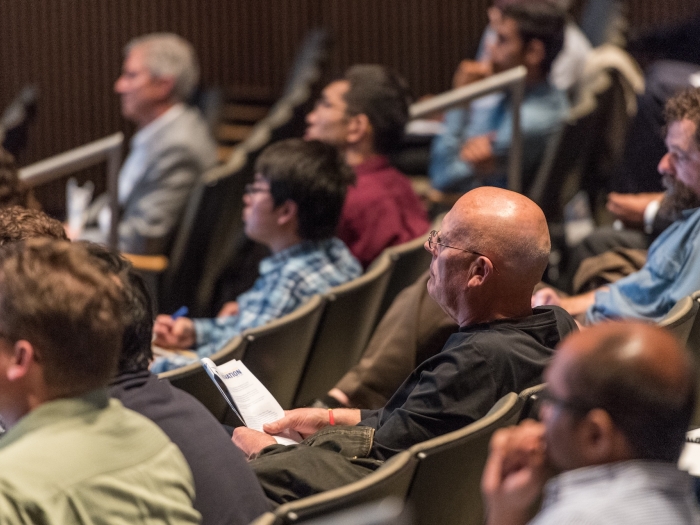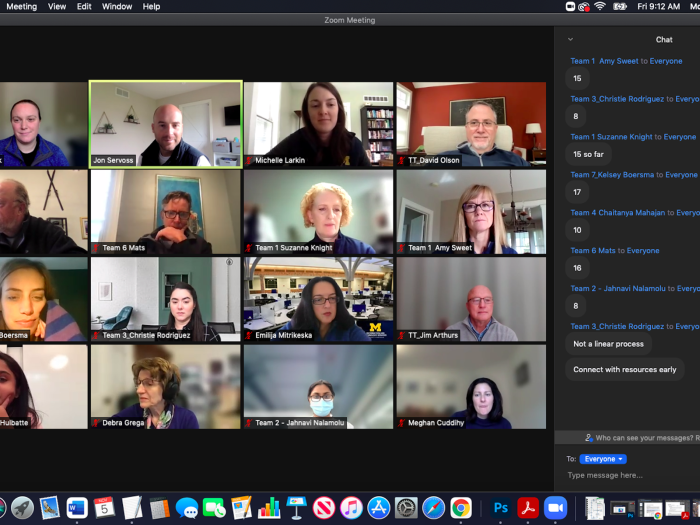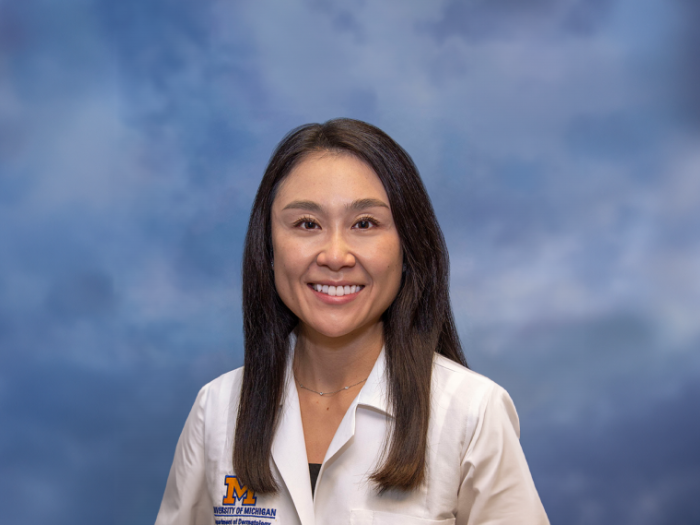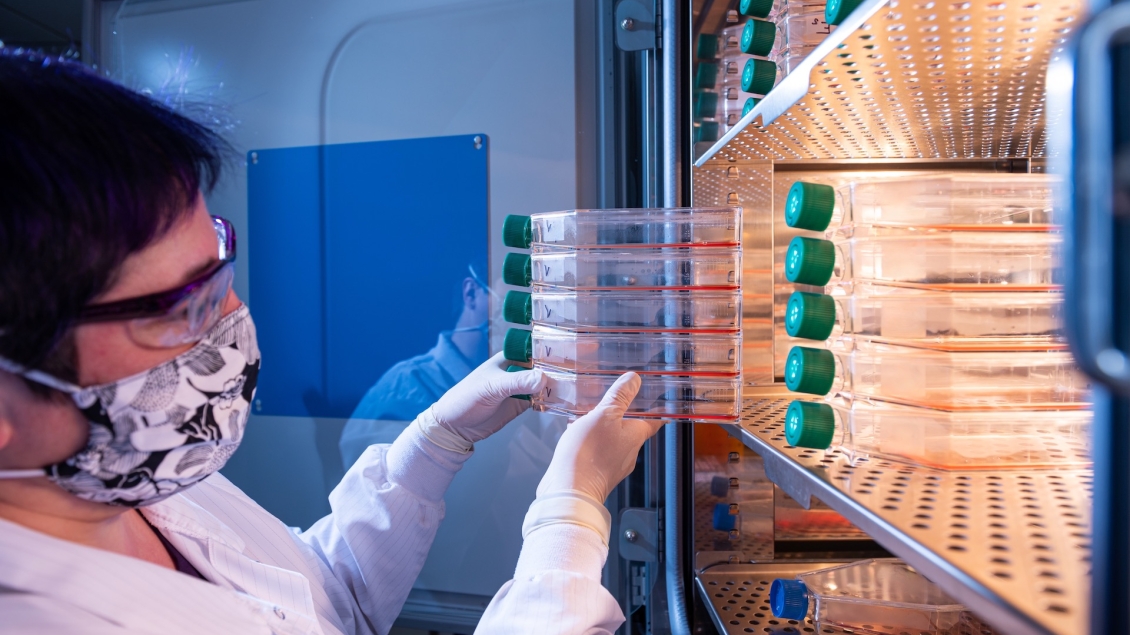
Producing gene transfer vectors that facilitate the transfer of specific genes into either normal or aberrant cells.
The Vector Core produces gene transfer vectors that facilitate the transfer of specific genes into either normal or aberrant cells. We also provides intellectual and technical advice to researchers regarding the optimal use of these systems. Gene transfer vectors require special handling precautions and manufacturing systems that lend themselves to a core structure that optimizes efficiencies of scale and cost to the research community.
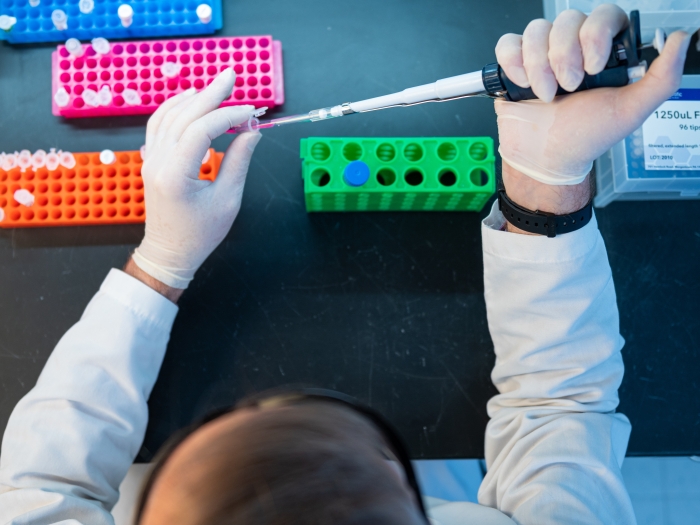
providing high expression, transient transfection to a wide variety of dividing and non-dividing cell types

providing broad host range and long-term expression in vivo
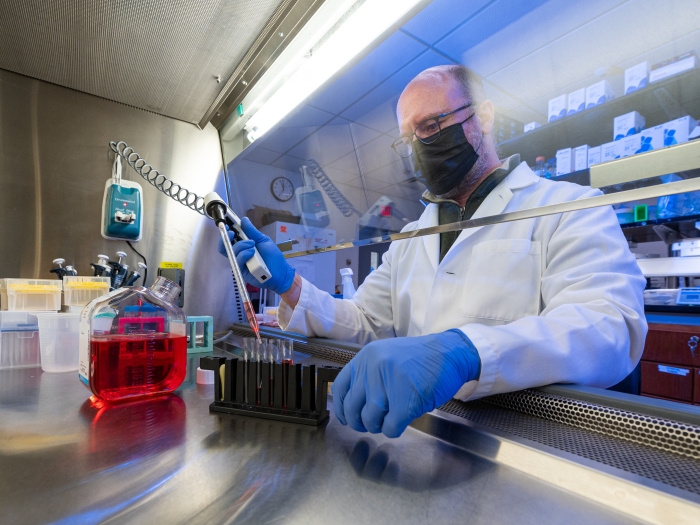
services including adenoviral shuttle plasmids, retroviral plasmids, lentiviral plasmids, CRISPR/Cas9 genome editing plasmids and pUMVCexpression plasmids

retrovirus providing stable integration in both dividing and nondividing cells, used for the production of permanent cell lines and long-term modifications for in vivo and ex vivo applications
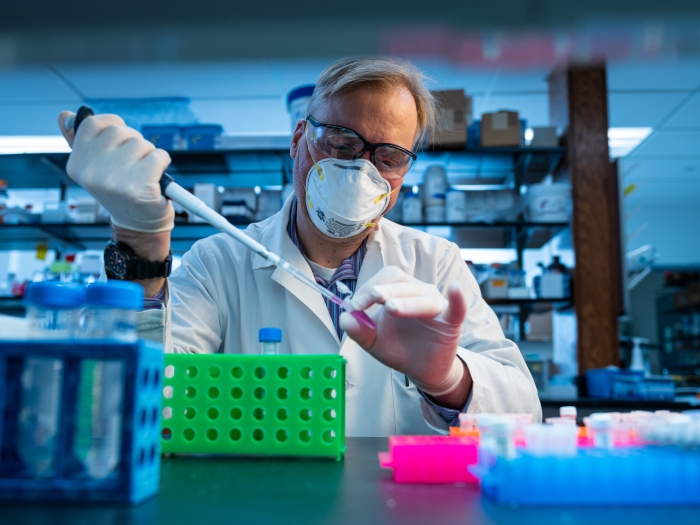
stocking all GE Dharmacon pGIPZ V2L (Oligo ID #) clones and a selection of lentiviral miRNA/shRNA clones in the pGIPZ V3L, pTRIPZ, and pLKO backbones

providing stable integration in dividing cells, used for the production of permanent cell lines and long-term modifications for in vivo and ex vivo applications
| Service | Rate (internal) | Rate (external) | Turn-Around Time | Notes |
| Adenoviral – Construction with Plaque Amplification | $1,031.00 | $1,546.50 | 4 weeks for construction (minimum). For external users: Additional time needed for amplification (2 weeks) and titering (2 weeks). | For each construction, 50 μg of shuttle DNA (purified and completely cut by either PmeI or NheI) is required. For custom construction of commercial vector systems that are already full length (such as AdenoX, Adeasy), please linearize the plasmid according to the system specifications. |
| Adenoviral – Large Scale Purification and Expansion | $1,681.00 | $2,521.50 | 2 weeks | Need 100 μl of lysate or 10 μl purified. Make sure the virus has not been serially propagated. |
| Clonal Isolation and Plaque Amplification | $454.00 | $681.50 | Up to 12, 1 ml amplified clones of adenovirus (primary lysate). | |
| Adenoviral – Standard Glycerol Stock | $295.00 | $442.50 | same day | Pre-made stocks of popular viral vectors at 1012 particles. Titer is included. Each sample is 0.25 mls. Store at -80°C. |
| Adenoviral – Titer (plaque assay) | $354.00 | $531.00 | 3 weeks | This requires at least 20 μl of purified virus. |
| Adenoviral – Crude Lysate, 50 mls | $245.00 | $367.50 | 2 weeks | The cell debris is removed, but Crude Lysate is NOT purified or concentrated. |
| Service | Rate* (internal) | Rate (external) | Turn-around Time | Notes |
| Adeno-Associated Virus tester scale prep (50 ul of ~1×10 13 vg/ml virus) | $987.00 | $1,480.50 | 2 weeks | We offer serotypes: AAV-1, -2, -5, -6, -7, -8, -9, -PHP.B, -PHP.eB, -PHP.S, -Retro (*if you need a different serotype than the ones listed, please inquire). Each tester scale AAV prep requires 25μg of purified DNA. |
| Adeno-Associated Virus Small scale prep (300 ul of ~1×10 13 vg/ml virus) | $1,533.00 | $2,299.50 | 2 weeks | We offer serotypes: AAV-1, -2, -5, -6, -7, -8, -9, -PHP.B, -PHP.eB, -PHP.S, -Retro (*if you need a different serotype than the ones listed, please inquire). Each small scale AAV prep requires 130μg of purified DNA. |
| Adeno-Associated Virus Large scale prep (1000 ul of ~1×10 13 vg/ml virus) | $2,647.00 | $3,970.50 | 2 weeks | We offer serotypes: AAV-1, -2, -5, -6, -7, -8, -9, -PHP.B, -PHP.eB, -PHP.S, -Retro (*if you need a different serotype than the ones listed, please inquire). Each large scale AAV prep requires 400μg of purified DNA. |
| Adeno-Associated Virus Pre-made Stock (50 ul of 1×10 13 – 1×10 14 vg/ml virus) | $248.00 | $372.00 | same day | Currently we offer GFP, mCherry, and CRE driven by several different promoters packaged in several serotypes; please inquire. We also have Brainbow (rAAVPHPeB-EF1a-BbTagBY and rAAVPHPeB-EF1a-BbChT). We are making new stocks all the time, so check with us or provide input on viruses to stock. |
| Adeno-Associated Virus Titering Service | $202.00 | $283.00 | For titering up to 5 Adeno-Associated Viruses. |
| Service | Rate (internal) | Rate (external) | Turn-Around Time |
| Plasmid Midi Prep (~100 μg) | $91.00 | $136.50 | 1 week |
| Plasmid Maxi Prep (~0.5 mg) | $160.00 | $240.00 | 1 week |
| Plasmid Mega Prep (~1mg) | $298.00 | $447.00 | 1 week |
| Plasmid Giga Prep (~5 mg) | $613.00 | $919.50 | 1-2 weeks |
| Plasmid DNA Transformation into Bacteria | $95.00 | $142.00 | 1 week |
| Service | Rate (internal) | Rate (external) | Turn-Around Time | Notes |
| Lentiviral shRNA tester samples (5 × 3 ml of 1X virus in DMEM+10%FBS) | $309.00 | $463.50 | 2 weeks | PLEASE note the backbone of each construct, so the Vector Core can check the packaging generation. Each 3 ml tester prep requires 2.5 μg of purified proviral plasmid DNA. |
| Lentiviral/Retroviral – Concentrated Small Scale Prep (10 mls of 10X virus in DMEM or as requested) | $678.00 | $1,017.00 | 2 weeks | PLEASE note the backbone of each construct on the order form, so the Vector Core can check the packaging generation. Each small scale prep requires 70 μg of purified proviral plasmid DNA. This retroviral service requires the VSVG envelope. |
| Lentiviral/Retroviral – Concentrated Large Scale Prep (100 mls of 10X virus in DMEM or as requested) | $1,627.00 | $2,440.50/td> | 2 weeks | PLEASE note the backbone of each construct on the order form, so the Vector Core can check the packaging generation. Each large scale prep requires 650 μg of purified proviral plasmid DNA. This retroviral service requires the VSVG envelope. For in-vivo work, 100X concentration is typical. |
| Lentivirus – Pre-made Standard Virus Stock (10 mls at 10X in DMEM) | $366.00 | $549.00 | same day | Pre-made stocks of popular lentiviral vectors at 107 TU/ml (pLL3.7dsRED, pLLEV GFP, pLLRSV GFP, pLLEV Luc, pGipZ Scrambled). Store at -80°C. |
| Retrovirus – UNCONCENTRATED Small Scale Prep (100 mls of 1X virus). For ecotropic and amphotropic envelope pseudotypes. | $564.00 | $846.00 | 2 weeks | For use with MMLV/MSCV plasmids pseudotyped with ecotropic and amphotropic envelopes which are too fragile to concentrate without great loss. The unconcentrated small scale prep requires 100 μg of proviral DNA. |
| Lentiviral/Retroviral Transduction | $310.00 | $465.00 | 1 week | Transduction of lentiviral constructs onto cells provided by the customer, or on A549 lung carcinoma cells provided by the Vector Core. |
| Lentiviral/Retroviral Titer with Fluorescence | $369.00 | $553.50 | 1-2 weeks | 200 μl of virus is required. |
| Lentiviral/Retroviral Titer with Antibiotic Selection | $417.00 | $625.50 | 2-3 weeks | 200 μl of virus is required. |
| Service | Rate (internal) | Rate (external) | Turn-Around Time | Notes |
| In-Stock shRNA Library Clones | $35.00 per clone (if available in our library) | Not Available | 1-2 days for in-stock clones | The Vector Core currently stocks all pGipZ V2L and a few other lentiviral shRNA/shRNAmir clones. Please click the shRNA services above. |
| Non-Stock pLKO Clones | $55.00 per clone /td> | Not Available | Varies | The Vector Core currently stocks pLKO clone ordering through Sigma for any clones that we do not currently carry in our stocks. |
| Service | Rate (internal) | Rate (external) | Turn-Around Time | Notes |
| 1-hour consultation | $51 | $70 | 1 week to schedule appointment time | Having trouble planning/executing your project? Message us at [email protected] to schedule a time to discuss how to use our vectors. |
| Custom Services | Inquire | Inquire | Do you require a service not listed? Message us at [email protected] with what you require and we will customize a solution for you. |
* Discounts may be available for members of Centers that support the Vector Core (Cancer – 30%; GI Peptide – 50%).
Many factors contribute to selecting the best viral vector for your gene expression studies. Use the chart below to help determine which virus will work best for your research. Then, request a consultation with the Vector Core to get started on your project.
| Features | Adenovirus | AAV | Lentivirus | Retrovirus |
| Gene Expression | Transient | Sustained expression in terminally-diff cells | Stable (can be used for transient studies) | Stable (can be used for transient studies) |
| Infect Dividing Cells | yes | yes | yes | yes |
| Infect Non-Dividing Cells | yes | yes | yes |
no |
| Integration into Target Cell Genome | no | no | yes |
yes |
| Immune Response in Target Cells | high | very low | low | moderate |
| Tropism | broad host range | depends on serotype | depends on envelope protein | depends on envelop protein |
| Relative Viral Titer (how much virus you can produce) | XXXX | XXX | XX | XX |
| Packaging Limits | up to 7.5kb | ~4.4kb | ~6.5kb | ~7.5kb |
| Capable of Co-Infection? | yes | yes | poorly (cannot co-infection but can do sequential) | poorly (cannot co-infection but can do sequential) |
| Expression Level | very high | moderate | moderate | moderate |
| Envelope Options (offered by the Vector Core) | none | Serotypes: 1, 2, 5, 6, 6.2, 7, 8, 9, rh10, hu11, rh32.33, Retro, PHP.B, PHP.eB, PHP.S | Flexible; VSVG is preferred but can also use GALV, ecotropic, RD114/TR | Flexible; VSVG is preferred, but can also do ecotropic, amphotropic, RD114 |
Please note: Titers can vary dramatically depending on how it’s measured. With all viral systems, caution is encouraged when using titers of viruses obtained from different sources (i.e. in the Vector Core, we do functional titers for lentivirus and retrovirus). Please contact the Vector Core if you have questions.
A virus safety training course is available for users, which is sponsored by EHS and the Institutional Biosafety Committee and is presented by Tom Lanigan. Individuals planning to work with viral vectors are recommended to enroll in the course “Working Safely with Viral Vectors” (course #BLS008) which is offered every other month starting in January. The course is free to U-M employees and re-registration is required through My LINC.
View the slides from “Working Safely with Viral Vectors."
Material Safety Data Sheets
Recombinant Adenoviral
Recombinant Lentiviral
Recombinant MoMLV
- All recombinant DNA work using viral vectors must be registered with the U-M Institutional Biosafety Committee (IBC). The purpose of this committee is to ensure the safety of university employees by tracking recombinant DNA work at the U-M. Registration is available at the IBC website. Approval of registered rDNA work typically occurs within two weeks. (Note: Registration required for all new viruses, and any modifications to previously registered viruses.)
- Login to MiCores to request services from the Vector Core. To create an account and get started in MiCores visit the MiCores site.
- Feel free to contact the Vector Core at [email protected], or stop into the Vector Core at 3554 MSRB II to speak with any staff if you should have any questions during the process.
- All recombinant DNA work with viral vectors must be registered with the U-M Institutional Biosafety Committee (IBC)*. This registration is a safety precaution to protect our employees from possible safety concerns. The IBC committee is responsible for tracking recombinant DNA work at the U-M. If an investigator wishes to have the U-M Vector Core create, propagate or purify a custom vector, then a registration application must be submitted on-line to the IBC using the form for EXTERNAL investigators.
*NOTE: Purchase of a Vector Core stock virus or plasmid does not require U-M IBC registration. - Login to MiCores to request services from the Vector Core. To create an account and get started in MiCores, visit the MiCores site.
- Evidence of payment must be received before the product can be shipped.
- Feel free to contact the Vector Core at [email protected] if you have any questions during the process.
General Protocol for Infecting Cells with Adenovirus
Protocol for Linearization and Purification of the Adenoviral Shuttle Plasmid
General Protocol for Lentiviral Transfection
Titering Lentivirus (non-GFP)
Titering Lentivirus (GFP)
Lentivirus/Retrovirus Transduction Protocol for Adherent Cell Types
Isolation of Viral DNA from Adenoviral Lysate
Isolation of Viral DNA from Purified Adenovirus
All viruses handled at the U-M need to be registered with the Institutional Biosafety Committee (IBC). The IBC determines the biosafety level for each virus. In general, most of the recombinant viruses produced in the Vector Core are classified as Biosafety Level II for agents considered of ordinary potential harm. These recombinant viruses include E1, E3-deleted adenovirus and third-generation, self-inactivating (sin) lentivirus. Federal regulations can be found here.
Both adenovirus and lentivirus have a wide host range in mammalian cell lines and primary cells. Both viruses infect dividing and non-dividing cells. There are few cell lines that cannot be infected with adenovirus or lentivirus. Retrovirus (MMLV) host range is not as wide as lentivirus, but still works well in many types of dividing cells. We recommend first testing your cell system with one of our adenovirus or lentivirus reporter viruses.
For adenovirus, we prefer 50 μg (minimum of 25 μg; preferably 1 μg/μl) of plasmid linearized with either PmeI, NheI, SfiI, or SwaI (see Protocols and Useful Links). We recommend that the DNA be heat inactivated after digestion and a sample run on the gel to confirm proper digestion. The DNA should then be phenol chloroform extracted, ethanol precipitated and resuspended in water. Preparation of the plasmid is important. We do not recommend gel extraction. For lentivirus and retrovirus, we need 100 μg and 840 μg of high quality plasmid for the small and large scale preps, respectively.
The contact and billing information in the top box is required information. For ordering product, just write in the name of the product(s) in the appropriate box and the quantity that you request. Note: for U-M customers, if you are ordering adenovirus construction, then code AA (plaque amplification) is required with code AT (DNA transfection for adenovirus construction). A large scale adenovirus purification and expansion does not include a titer (code AP).
Lentivirus:
shRNA tester samples – 5, 3 ml unconcentrated supernatant. Small scale production – 100 mls of supernatant concentrated 10X (10 mls of 10X virus).
Large scale production – 1 liter of supernatant concentrated 10X (100 mls of 10X virus).
Titers of unconcentrated lentivirus generally 1×106 transduced units/ml (1×107 transduced units/ml for 10X concentrated virus) with our standard rHIV vector using GFP as the readout. Titers may vary depending on the transgene being expressed, the system used, the quality of the proviral plasmid DNA and titering method.
Retrovirus (MMLV):
Small scale production-VSVG env-concentrated – 100 mls of supernatant concentrated 10X (10 mls of 10X virus).
Large scale production-VSVG env-concentrated – liter of supernatant concentrated 10X (100 mls of 10X virus).
Small scale production-ecotropic or amphotropic env-unconcentrated – 100 mls of supernatant.
Large scale production-ecotropic or amphotropic env-unconcentrated – 1 liter of supernatant.
Titers are generally 1×107 transduced units/ml for VSVG enveloped, 10X concentrated virus and 1×106 transduced units/ml for ecotropic or amphotropic enveloped, unconcentrated virus with our standard rMMLV vector using GFP as the readout. Titers may vary depending on the transgene being expressed, the system used and the quality of the proviral plasmid DNA.
Adenovirus:
The customer receives all virus that is produced. This amount varies dramatically depending on the viral system, transgene expressed, and quality of the starting virus. We aim for 4×1012 particles/ml. The typical yield is around 1.0-4.0×1013 total particles.
Virus production is done first come, first served. The times listed below are estimates. The time may be longer due to large order volume or if a problem is encountered.
Adenovirus: Virus construction and transfection (code AT) and plaque amplification (code AA) – 4-5 weeks. Note: this process is the most difficult and most variable. It may take more than one attempt to make virus. This is in part because we overlay the cells and pick viral plaques for clonal isolation to assure the highest quality of virus. Adenovirus purification and expansion (code AL) – 2 weeks Titer (plaque assay) – 2-3 weeks
Lentivirus and Retrovirus: Two weeks once we receive sufficient quantity of the proviral plasmid to perform the transfection.
The appropriate amount of virus used for infecting cells is very important for the outcome of your experiments. The optimal concentration differs dramatically between cell types. Too much virus uptake by the cells will cause cytotoxicity (with adenovirus) and too little virus will not give you 100% infection of the cells. The optimal concentration needs to be determined empirically. For these pilot studies, a marker virus such as β-gal or GFP is available. For adenovirus, optimal virus concentration for most cells is between 50 and 1000 MOI (multiplicity of infection; MOI x # of cells = pfu required). (click here for protocol). For lentivirus, optimal infection may require linker molecules or other “tricks” (click here for protocol).
A titer is the standard for determining how much virus to add to cells or inject into animals. Many journals will require a titer for publication. A titer (PFU/ml) is also needed to calculate MOI. Since the percent of live viral particles (VP) can vary drastically between any two viruses or preps, a titer is a way to normalize between viruses. The problem with titers is that they can also be variable depending on the type of assay used to determine the titer, the cells used and the person performing the assay. All Vector Core viruses are prepared the same way using standard procedures. There is very little variation in the VP:IU (infectious unit) ratio and the titers of all the viruses that we make are within a small range. Therefore, when using multiple viruses produced from the Vector Core, either particles or titer is fine.
We recommend the following amounts of virus-containing media for infection: 10-cm plate: 8-10 ml per plate; 6-well plate: 1 ml per well; 12-well plate: 0.5 ml per well; 24-well plate: 0.2 ml per well. This roughly reflects the surface area of each well or plate.
Yes, as long as it’s used with caution and it comes from a fetal animal. Serum from an animal that has been born runs a risk of having antibodies against the virus, particularly adenovirus.
Viral particles (VPs) represent the total number of viral particles (live and dead). The amount of viable virus varies dramatically depending on how the virus is purified and stored. PFU (plaque formation unit) or infectious units represents the number of infectious or live viruses. It reflects the amount of working viruses in the preparation. VP/PFU ratio is generally 20:1 to 100:1. Vector Core adenovirus preps are about 25:1. Multiplicity of infection (MOI) is the number of viral copies per cell. It can also be thought of in terms of pfu per cell. It is calculated by MOI x # of cells= pfu required.
We recommend that adenovirus be placed at -70°C or colder for long term storage. NOTE: Freeze-thawing will result in loss of infectious particles. For best results, thaw virus on ice and aliquot the amount you typically use per experiment into separate microfuge tubes. DO NOT freeze-thaw more than two times.
Adenovirus storage buffer: The adenovirus is suspended in 10 mM Tris-HCl pH 7.4, 137 mM NaCl, 5 mM KCl, 1 mM MgCl2 to which glycerol has been added to 10% by volume.
Lentivirus and MMLV storage buffer: DMEM or as requested.
Replication competent adenoviruses (RCAs) are wild-type like viruses in a population of replication-deficient viruses. RCAs result from a crossover event where the deleted E1 region of the virus re-inserts itself into the virus while being grown in packaging cells. Once this happens, the RCA adenovirus will replicate without the need of a packaging cell line and outgrow recombinant adenovirus in packaging cells. To avoid the occurrence of RCA, viruses should not be serially propagated. Recombinant adenovirus with high RCA can be rescued by clonal isolation after plaque assay.
Adenovirus: 100% gene delivery efficiency in most cell types including dividing and non-dividing or primary cells. It’s a high expression, transient vector system. There is no integration with the host system. Protocols involved in developing recombinant adenovirus are complicated.
Lentivirus: Greater than 80% efficiency in most dividing cell types. Efficiency is lower in most non-dividing cell types and in most suspension cells. Lentivirus is a stable, low expression vector system due to integration into the host genome. Lentivirus may lead to mutation of genes in the host system.
Retrovirus (MMLV): gives <40% efficiency in most cell types, and requires active cell division. MMLV, like lentivirus, is a stable, low expression vector system due to integration into the host genome. MMLV may lead to mutation of genes in the host system.
| Viral Vector | Vector Core Storage Buffer | Temperature | Other |
| Adenovirus | The adenovirus is suspended in 10 mM Tris-HCl pH 7.4, 137 mM NaCl, 5 mM KCl,1 mM MgCl2 to which glycerol has been added to 10% by volume | -80° C | Avoid freeze/thaw |
| Lentivirus | Any | -80° C | Freeze-thaw a maximum of three times |
| MoMLV | Any | -80° C | Avoid freeze/thaw |
| Plasmid | Any | -80° C |
| Viral Vector | Maximum Insert Size | Preferential Target Cells | Common Research Applications | General Advantages |
| Adenovirus | 7.5kb | Transduces cells with CAR & avB integrins receptors very wellWill transiently transduce many primary cells at high efficiency | In vitro and in vivo transient transgene expression | Ease of use in vitro and in vivo; high titers |
| Lentivirus | > 6.5 kb | Will transduce (via integration) differentiated non-dividing cells including most hematopoietic-derived cells and neurons, as well as dividing cells. | Stable integration allows for both production of permanent cell lines for in vitro applications and long-term modifications for in vivo and ex vivo applications | Transfects dividing and non-dividing cells; integration into genome; wide spectrum of target cells |
| Retrovirus (MoMLV) | > 6.5 kb | Stable integration allows for both production of permanent cell lines for in vitro applications and long-term modifications for in vivo and ex vivo applications | Stable integration allows for both production of permanent cell lines for in vitro applications and long-term modifications for in vivo and ex vivo applications | Integration into genome:; wide spectrum of target cells |

1150 West Medical Center Drive
Ann Arbor, MI 48109
